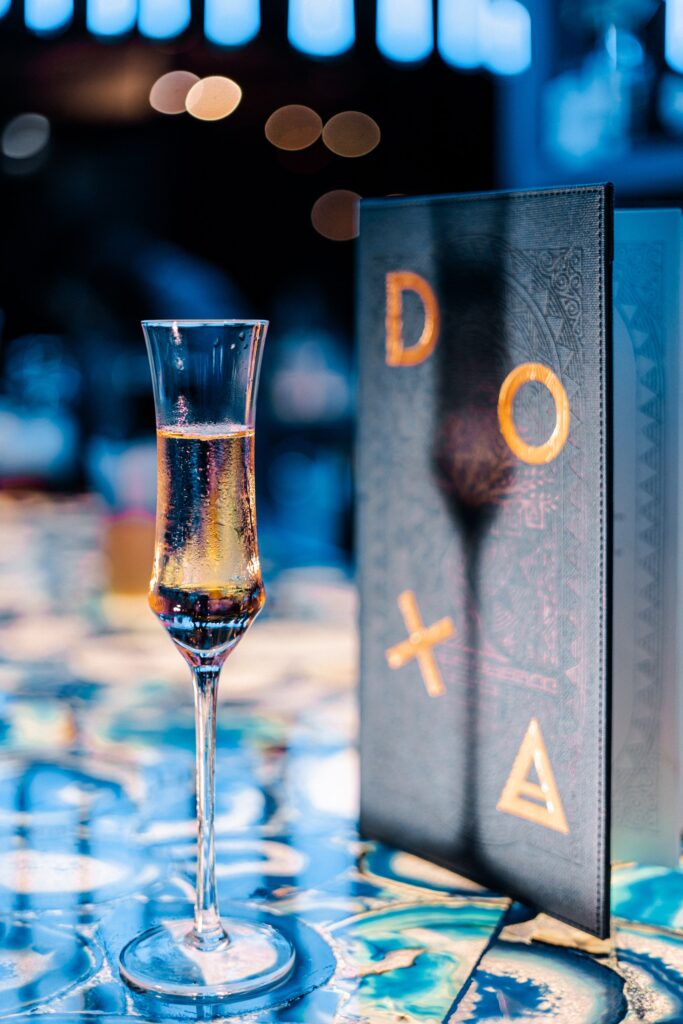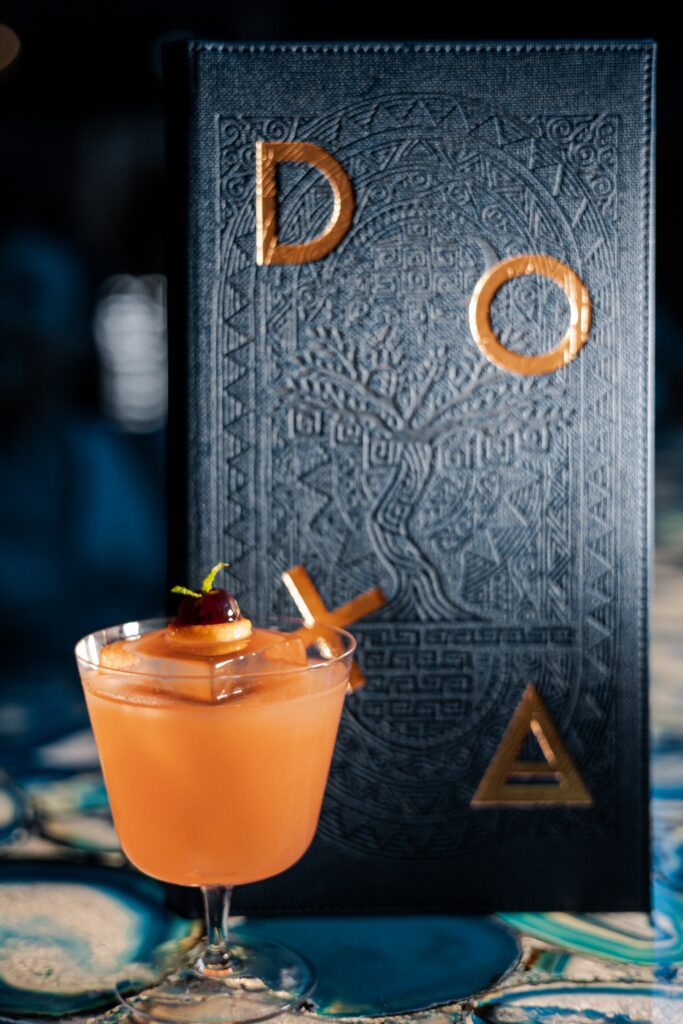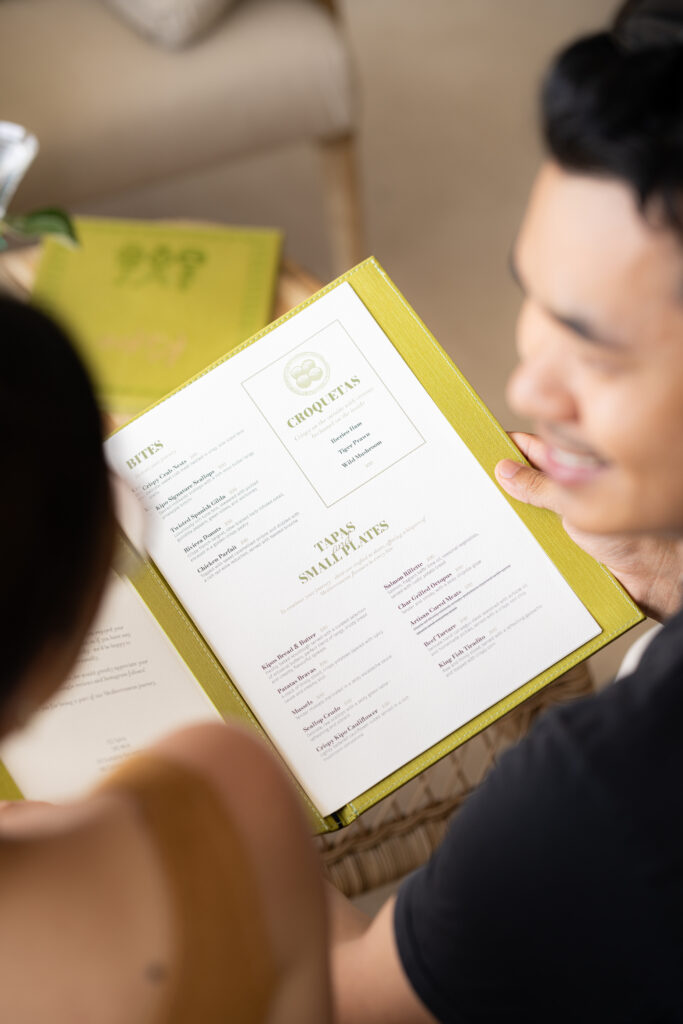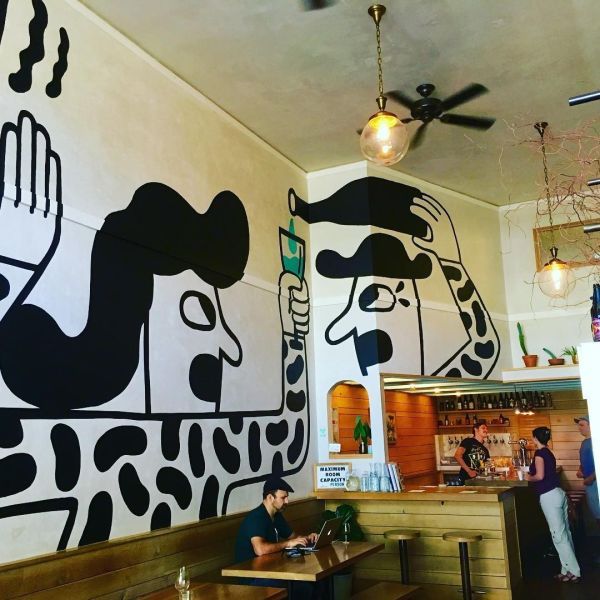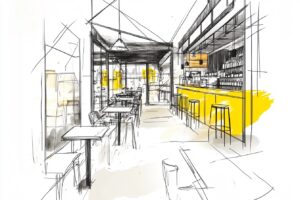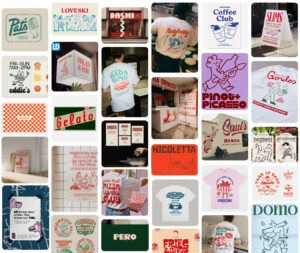Bilingual, Picture and Branded Menu design from probably* the greatest menu design company in the world!
*I'm almost sure there are no other agencies that have covered the depth of menu design as we have.
Scroll Pinterest for “menu design” and you’ll drown in vanilla templates that wouldn’t pass muster at logistic tradeshow sandwich stand. Meanwhile, the real money is made on menus that speak to the experience of the venue, and quietly steer guests towards the ‘best’ choices.
Mixing clear communication, brand experience and sales together is challenging. Add in the need for bilingual and photography for the Asian market, then the problems multiply. That’s what we’ve spent the last hundred-plus projects perfecting, food shoots and all!
I’ll spare you the waffle, a few recommendations to approach, then we’ll jump into the images.
Our menu design playbook
- Connect the menu with the interior design
Menus shouldn’t live in isolation. Carry visual elements across wall finishes, coasters, uniforms, and signage. The experience becomes richer when every touchpoint speaks the same visual language. - Balance the Chef’s ambition with business vision.
Chefs and owners don’t always agree, a great menu balances creative expression with commercial sense. Facilitate that conversation early, so the finished product knows what it’s trying to sell. - Rename dishes to fit your story.
A dish name is part sales tool, part brand moment. Align it with your identity: “Oaked Roku Gin Negroni” says something about your Japanese inspired cocktail menu; “Barrel Aged Negroni” does not. Words matter. - Be smart about pricing and positioning.
Use pricing, decoys, and bundles to guide guest behavior—but always build it on real margin data, not guesswork.
- Shoot like you mean it.
Photography sells. Plan for lighting, plating, texture, and context. If the menu relies on pictures, the food needs to look good under pressure—and consistent across outlets. - Don’t ignore materials.
The feel of the paper, the sheen of a UV coating, even how a fold sits on a table—all affect perception. Your menu should feel like it belongs in the space. Know your production limitations and budgets before you design. Is the client printing in-house on standard stock, or using letterpress on handmade paper? - Build for updates, not just launch.
If your chef changes the menu weekly, cloud-based layouts save time and stress. Real-time editing and approval loops make menus agile and collaborative. - Measure what matters.
After launch, track performance. Which dishes are flying? Which need a boost? A/B testing and sales-mix reviews help your menu evolve intelligently—not just reactively.
Add those all together and the menu turns from a list into your most persuasive salesperson.
Menu inspiration gallery
DOXA, Phuket
Challenge: Make esoteric, high-ticket cocktails feel approachable to tourists
Solution: Created a myth-infused, premium drink list, Black-on-gold picture menu framing each signature as an artefact
KIPO Restaurant, Phuket
Challenge: Tell a maximalist Greek-meets-Thai story without confusing diners
Solution: Delivered Mediterranean flair with bilingual, icon-rich pages that weave folklore into every dish title
Pomodoro, Shanghai
Challenge: Create a picture first menu that explains the brand. but do so without taking any expensive photos. AI, food photos and photoshop! Oh and fully bilingual.
Solution: Full photo spreads of aspirational Roman holidays plus “chef’s picks” call-outs steering guests toward high-margin antipasti.
View the whole Pomodoro menu design in the case study.
FIRA Beach Club, Phuket
Challenge: One venue, three day-parts, endless cocktails
Solution: Modular boards that flip from smoothie bowls at dawn to champagne magnums by dusk, keeping tone consistent
Element Fresh, China
Challenge: Menu sprawl after 20 years of growth
Solution: Modernised and slimmed the range with colour-coded health icons and half-page hero photos that upsell smoothies
Fat Cow Steakhouse
Challenge: Too many low-margin mains dragging profit
Solution: Re-engineered layout to spotlight sides and add-ons, lifting “extra fries” from bottom to top seller
Google (APAC Cafés)
Challenge: Staff queues slowing service lines
Solution: One-glance picture boards with traffic-light labels that speed decisions without sacrificing Google quirk
Chili’s, China
Challenge: US menu too wordy for local guests
Solution: Localised with photo-driven mix-and-match platters and a simplified pricing grid that pushes combo upsells
Outback Steakhouse
Challenge: Inconsistent steak photos across regions
Solution: Ran multi-year food shoots and built a cloud asset library to standardise imagery and support seasonal updates
Penrose, Shanghai
Challenge: Three venues, six weeks, one printer deadline
Solution: Template-driven bilingual layouts for lightning-fast production chain-wide
The Refinery
Challenge: Shift from gastro-pub to upscale bistro
Solution: Simplified categories and haloed hero dishes with subtle price shading to raise average order value
Fook Wo Kong
Challenge: Signal luxury without scaring tourists
Solution: Linen-bound menus with spot-UV dish icons that deliver premium cues while staying guest-friendly
Iora, Bali
Challenge: Champion local farmers and provenance
Solution: Layered picture menu featuring farmer portraits and chef’s notes to justify price and celebrate produce
PHO STORE
Challenge: Build-your-own confusion at the counter
Solution: Neon colour-coded steps guiding bowl creation and nudging profitable add-ons
Homeslice Pizza
Challenge: Keep cult buzz alive as brand scales
Solution: Fold-out slice selector with beer-pairing grid that nudges guests toward a second drink
Cages Sports Bar
Challenge: Large groups ignored share plates
Solution: Game-board layout highlighting snack bundles sized for teams
La Mezcaleria
Challenge: Educate first-timers on mezcal flights
Solution: Vertical tasting ladder that escalates curiosity—and spend—with each tier
La Barra
Challenge: Menu fatigue in a tapas format
Solution: Refreshed tile-style layout with dual-price salad options to encourage mixing and upsizing
Bonica
Challenge: Guests stuck on burgers, not grill platters
Solution: Heat-level icons and platter-builder sidebar that pull diners toward premium sharing dishes
Mercedes Me Café
Challenge: Merge lifestyle brand with café offer
Solution: Tri-fold poster menu linking each dish to a car milestone for seamless storytelling
White Castle China
Challenge: US format bewildered first-time diners
Solution: Counter boards with clear photos and simplified set meals tuned for local tastes
Porsche GT Café
Challenge: Turn car geeks into dessert buyers
Solution: Racetrack-themed layout that guides guests from starters to “finish-line” sweets
Beast of the East
Challenge: Beer sales eclipsed food margins
Solution: Pint-pairing grid nudging wings and fries to boost food-to-beer ratio
Yonghe King
Challenge: Breakfast sides underperforming
Solution: Colour-coded combos featuring soy-milk sidekick to lift add-on sales
The business case for a well thought out menu
- A well-engineered menu adds 10–15 percent to bottom-line profit, according to Forbes.
- Cornell research found that giving dishes vivid, sensory names boosted sales 28 percent and let restaurants charge 12 percent more.
Add those three together and the menu turns from a laminated afterthought into your most persuasive salesperson.
Ready to turn paper into profit?
Drop us a line, snag a mood board or book a ten-minute discovery call. Your chef will thank you, your accountant will *really* thank you, and your guests won’t even know they’ve been gently nudged toward the good stuff.
Let’s make your menu your MVP.
Ping Ben & the Thread crew here, or at very least give our newsletter a sign up!

